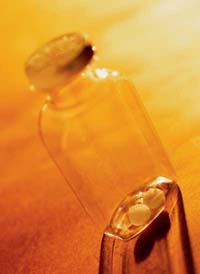Before heading to the dentist, you might want to try the following home remedies first. They just might ease your jaw pain. Of course, see a professional if the ache doesn't let up.
Massage those jaws. Pain can come from muscle spasms. Massaging the jaw joints, which lie just in front of the ears, will help relax tight muscles.
Heat it up. Heat is an excellent muscle relaxant. Use a heating pad or hot-water bottle to ease aching jaw, neck, and shoulder muscles. Be careful to keep the heat low enough not to cause burns to the skin in these sensitive areas, though.
Cool it down. Ice packs placed on the jaw joints are excellent for relieving pain. To combat both muscle tightness and pain, you might also try alternating heat and cold treatments; apply heat for about 20 minutes, followed by cold for about five or ten minutes, switching between the two until you achieve relief.

©2007 Publications International, Ltd.
Decrease inflammation --
and muscle pain -- by taking
an over-the-counter pain
reliever such as ibuprofen.
|
Take over-the-counter (OTC) pain relievers. OTC aspirin, acetaminophen, or ibuprofen can relieve pain in the muscles. Aspirin or ibuprofen can also help bring down any inflammation that may be present. For a list of precautions to take when using over-the-counter analgesics, click here.
Teach an old dog new tricks. Become aware of and eliminate habits -- such as resting your head on your hand, cradling the phone between your shoulder and cheek, or clenching your teeth -- that tend to stress the jaw joint. If you work at a desk, sit up straight in a supportive chair and raise your work surface if necessary to prevent yourself from hunching over with your head propped on your hand. If you need to use both hands while talking on the phone, invest in a headset or use the speaker setting if available. And, if you often catch yourself unconsciously clenching your teeth while reading or working, try holding a cork gently between your front teeth to keep your jaws separated and relaxed.
Relax. Stress is a major contributor to TMJ problems. Relaxation techniques such as deep breathing, yoga, or progressive relaxation (in which you consciously relax muscles starting with the head and working down the body to the feet) can help, as can an enjoyable hobby or regular exercise.
You might also try visualization exercises to let go of stress. Find a quiet, comfortable place where you won't be disturbed. Close your eyes and take a couple of slow, deep breaths. Now, imagine yourself in one of your favorite places -- a beach, a mountain meadow, a country lane. Imagine what you would feel, see, hear, and smell if you were really there. Feel yourself relaxing in this special place. Tell yourself there's nothing you have to do, nowhere else you have to go. After several minutes of enjoying this visualization, take another couple of slow, deep breaths and slowly open your eyes. You may find that you feel amazingly relaxed and refreshed from this "mental vacation."
Find a TMJ Pro If you suspect or have been told that you have TMJD and self-care hasn't relieved your symptoms, you need professional help. A dentist may need to create a special mouthpiece, or "splint," to help the muscles relax, especially at night. The jaw may need to be permanently realigned through subtle shaping of the tooth surface (equilibration), moving teeth (orthodontics), or moving bony structures (orthopedics). In a few cases, surgery is even required.
That's why it's best to find a dentist who has extensive training and/or experience in the treatment of TMJ problems. Successful treatment may also require the services of an orthopedist; a neurologist; an ear, nose, and throat specialist; and a physical therapist or chiropractor. And if you're struggling with reducing or coping better with stress, you might benefit from a visit with a mental-health professional. Look for professionals with whom you feel comfortable and who will take the time to explain things to you.
You can ask for a referral from your regular dentist, contact your local dental association, or check the yellow pages to locate a TMJ specialist. Then use the following questions to help evaluate candidates and ensure that you get the expert care you need:
- What is your experience in treating TMJD?
- What special training have you received in treating TMJD?
- How many TMJD patients have you treated? What is your success rate?
- How long does treatment usually last? How much does it cost?
- How do you feel about a team treatment approach? What specialists do you typically use?
|
What's the bottom line for easing TMJ pain? Find a home remedy that helps you to relax and incorporate it into your daily life.
For more information about TMJ and how to combat it, try the following links: - To see all of our home remedies and the conditions they treat, go to our main Home Remedies page.
- Headaches can affect anyone, so read about Home Remedies for Headaches.
- Sinus problems are worse than headaches, but still commonplace. Click here for Home Remedies for Sinusitis.
ABOUT THE AUTHORS:
Timothy Gower is a freelance writer and editor whose work has appeared in many publications, including Reader's Digest, Prevention, Men's Health, Better Homes and Gardens, The New York Times, and The Los Angeles Times. The author of four books, Gower is also a contributing editor for Health magazine.
Alice Lesch Kelly is a health writer based in Boston. Her work has been published in magazines such as Shape, Fit Pregnancy, Woman's Day, Reader's Digest, Eating Well, and Health. She is the co-author of three books on women's health.
Linnea Lundgren has more than 12 years experience researching, writing, and editing for newspapers and magazines. She is the author of four books, including Living Well With Allergies.
Michele Price Mann is a freelance writer who has written for such publications as Weight Watchers and Southern Living magazines. Formerly assistant health and fitness editor at Cooking Light magazine, her professional passion is learning and writing about health.
ABOUT THE CONSULTANTS:
Ivan Oransky, M.D., is the deputy editor of The Scientist. He is author or co-author of four books, including The Common Symptom Answer Guide, and has written for publications including the Boston Globe, The Lancet, and USA Today. He holds appointments as a clinical assistant professor of medicine and as adjunct professor of journalism at New York University.
David J. Hufford, Ph.D., is university professor and chair of the Medical Humanities Department at Pennsylvania State University's College of Medicine. He also is a professor in the departments of Neural and Behavioral Sciences and Family and Community Medicine. Dr. Hufford serves on the editorial boards of several journals, including Alternative Therapies in Health & Medicine and Explore.
This information is solely for informational purposes. IT IS NOT INTENDED TO PROVIDE MEDICAL ADVICE. Neither the Editors of Consumer Guide (R), Publications International, Ltd., the author nor publisher take responsibility for any possible consequences from any treatment, procedure, exercise, dietary modification, action or application of medication which results from reading or following the information contained in this information. The publication of this information does not constitute the practice of medicine, and this information does not replace the advice of your physician or other health care provider. Before undertaking any course of treatment, the reader must seek the advice of their physician or other health care provider.

